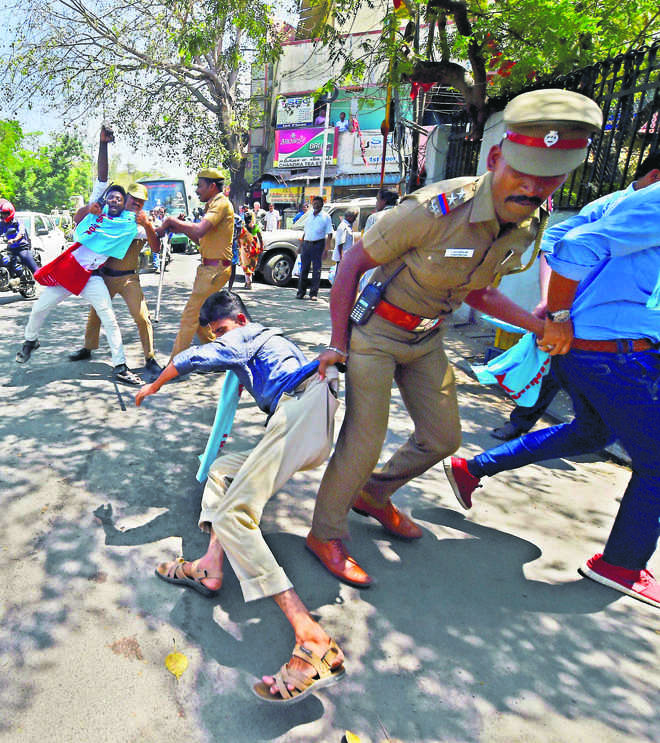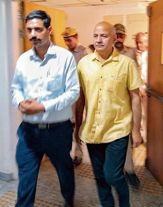
Far and wide: Tamil is the only Indian language that has evolved to naturally acquire a place of pride in other countries. Hindi, despite being promoted, has not made headway abroad. Tamil is an official language in Sri Lanka and Singapore; a language of education in Malaysia; a minority language in South Africa and Mauritius; and is used in Seychelles and Re-Union Island. There is, reportedly, a proposal afloat in Australia to make Tamil the third national language. Photos: Agencies
Shastri Ramachandaran
Although the outbreak of anti-Hindi protests by parties across the spectrum in Tamil Nadu saw Modi Sarkar 2.0 retreat from its bid to impose Hindi through the New Education Policy (NEP), the issue is unlikely to be ever resolved. As in the past, the Centre, regardless of the party in office, will continue to persist with its attempts, overtly and covertly, to keep pushing Hindi in Tamil Nadu. And, Tamil parties, as has been their wont, will protest against “Hindi imposition” when it is expedient; but, otherwise, keep silent and let Hindi creep in as has been the case for several years now.
Never in recent decades has there been as much Hindi imposed as from 2014 to 2019. Yet there were no protests. Asked about the prolonged silence of the Dravida parties, a Tamil MP said: “Saar, it is like India-Pakistan relations. Always there is tension below the surface. At times, it breaks out. When Tamil parties find it necessary, they will cry ‘Oh, Hindi imposition, we will fight it’. When it suits them, which is most of the time, they keep quiet. Hindi imposition is going on all the time in so many ways. Anti-Hindi protests depend on the convenience of the parties.”
Why were the dormant dynamics activated to good public effect at this juncture?
In the recent election, it is in Tamil Nadu that the BJP fared the worst. This was in spite of incumbency at the Centre and, indirectly, in the state. (In reality, post-Jayalalithaa, the AIADMK is an adjunct of the BJP, held together and kept in office by the Centre). Every time the BJP is thwarted in Tamil Nadu, the party thinks it is because of not having Hindi as its vehicle to reach out in the state.
In the first flush of its victory, the BJP thought it would be able to get the draft National Education Plan accepted. But, the devil in the detail was noticed and effectively used to stir the DMK, the ruling AIADMK and other parties to protest.
The outcry over the three-language plan to compel pupils in the South to learn Hindi, forced the Centre to make changes in its draft NEP 2019 and remove the controversial Hindi clause.
Now the draft states: “In keeping with the principle of flexibility, students who wish to change one or more of the three languages they are studying may do so in Grade 6 or Grade 7, so long as they are able to still demonstrate proficiency in three languages...” The original version had said that Hindi and English would continue to be among the three languages students would study in schools, be it in Hindi or non-Hindi speaking states. This was seen as a bid to make Hindi compulsory till Class VIII. Now, with the draft policy corrected, Hindi is not mandatory in Tamil Nadu.
However, Hindi — and contrary to Tamil Nadu’s avowed two-language (Tamil and English) policy — has been “imposed” long before it was mooted in the NEP. The central schools have always had Hindi, including as a medium of instruction for certain subjects. Schools under the CBSE have “imposed” Hindi one way or another, particularly from 2016 when both Hindi and Tamil became compulsory from Class I to VIII. When some parents objected, the schools showed a CBSE circular that made Hindi mandatory. Instead of resisting this imposition, the state balanced it by making Tamil also compulsory. Many DMK leaders, such as office bearers, MLAs and their family members are running schools where Hindi is compulsory. So much for the Kazhagams’ posture of being champions of Tamil and English and anti-Hindi crusaders.
This time, the parties were driven by compulsions arising out of the elections in which all were losers. The BJP drew a blank. The AIADMK got one Lok Sabha seat. The 37 seats won by the DMK-Congress alliance, did not lead to office either at the Centre or the state, as the DMK could not win a majority of the assembly by-elections to oust the ruling AIADMK.
In the event, DMK chief MK Stalin had to demonstrate his post-election strength by raising his voice against Hindi imposition. When one Kazhagam does it, others have to necessarily follow suit.
The outrage of the Dravida parties, though selective at times, has a historical basis. Hindi in the state’s schools has been an emotive issue for long. The first anti-Hindi protest broke out in 1937. It ended in 1940 only to erupt anew in 1965. At least 70 died in the anti-Hindi violence. Despite the assurance of Prime Minister Lal Bahadur Shastri in 1965 (and, before that, Jawaharlal Nehru in Parliament) that Hindi will not be imposed and English retained as the official language, Tamils were not mollified.
The anger against the Congress was manifest in the 1967 elections when a 27-year-old student leader of the anti-Hindi agitation defeated Congress titan K Kamaraj, and the DMK’s CN Annadurai became Chief Minister. Since then no ‘national’ party that espouses the cause of Hindi, has tasted power in Tamil Nadu.
The real, often unstated, grievance driving anti-Hindi sentiment is the belittling of Tamil, one of the world’s ancient and great classical languages. Tamils feel that India should take pride in being home to Tamil, which was declared a classical language less than 10 years ago. It is felt that any attempt to impose Hindi, although for political supremacy, is actually calculated to suppress Tamil and Tamil identity and culture.
Tamil is the only Indian language that has evolved to naturally acquire place of pride in other countries. Hindi, despite being promoted and pushed with all power and resources of the state, has not made headway abroad. Tamil is an official language of Sri Lanka and Singapore; a language of education in Malaysia; a minority language in South Africa and Mauritius; and used, sans any official status, in Seychelles and Re-Union Island. There is, reportedly, a proposal afloat in Australia to make Tamil its third national language.
No other Indian language has attained such a position in the world. Yet, as the Tamils see it, Official India takes no pride in the language. Instead, it wants to use Hindi to suppress Tamil and deny English to Tamils as their chosen language of success worldwide.
Opposition to Hindi has become more virulent as the BJP is perceived to be a “Hindi party”, which is also anti-English. Thus, the anti-Hindi protests in Tamil Nadu are as much a protest against the anti-Englishism of the BJP. Hindi is seen as the BJP’s crowbar to prise open a space for its ascendancy in Tamil Nadu. For, otherwise, there is the Dakshina Bharat Hindi Prachar Sabha, which promotes Hindi and produces Hindi teachers. The Sabha, founded by Gandhi some 100 years ago, has a great record of spreading Hindi; and, it is not targeted as a spearhead of Hindi education.
It is when a party at the Centre seeks to impose Hindi for political domination and in a quest for cultural supremacy, that anti-Hindi sentiments explode. For Hindi is then viewed as a threat to Tamil and Tamil identity and culture; as well as to English, which has been the Tamil’s tried and tested route to success at home and abroad from the colonial times to when information technology rules the world.
— The writer, a journalist, is a foreign affairs and political commentator



























